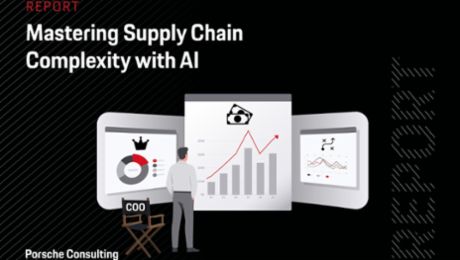Introducing our expert: Kevin Lin is a fascinating guide for anyone wishing to explore the world of artificial intelligence. He can whisk people away on an exciting virtual journey into the digital life of the future. The voyage is as captivating as a night at the movies. But science fiction is not his thing. Lin’s examples of AI applications are real and reflect mainstream business life. He takes a matter-of-fact approach and seeks concrete solutions that truly help companies move forward. And he consistently maintains a critical distance to the hype about an El Dorado of data.
Born in Taiwan in 1978, Lin studied mechanical engineering and semiconductor technology in his homeland before coming to Germany to complete his engineering studies at the prestigious RWTH Aachen University in North Rhine-Westphalia with a focus on aviation and aeronautics. A 2004 traineeship in suspension development brought him into contact with Porsche AG for the first time. Shortly thereafter he began working as a test engineer at the Stuttgart-based sports-car maker’s development center in Weissach.
While pursuing his doctorate at the Technical University of Darmstadt, Lin worked intensively on AI-supported causal analyses of business strategies and decisions. And in 2015 he joined Porsche Consulting. Now the technical director for a ten-member expert team, he is responsible for the management consultancy’s Artificial Intelligence and Data Analytics field together with Associate Partner Fabian Schmidt. In his personal life—perhaps as a counterbalance to his work—Lin has a fondness for analogue technologies. With great attention to detail, he is restoring a Beetle—or to be precise, a 1973 Volkswagen 1303 S with 50 horsepower, a 1.6‑liter capacity, and a Ravenna Green paint job. “It’s nearly finished,” he says. “Now all that’s needed is a complete overhaul of the original interior.”
In this interview Kevin Lin discusses whether business and industry are paying sufficient attention to the potential of artificial intelligence, and how data analytics can help them succeed.
How important are artificial intelligence and data analytics for our future?
“On the one hand, we’re working with ever greater volumes of data. Yet on the other, we’re expecting ever more detailed answers to complex questions. Excel spreadsheets and simple mathematics are not up to the job when it comes to things like spotting trends or identifying sources of error in complex contexts, for example. For that we need digital tools like machine learning and artificial intelligence. Those who don’t master the use of digital tools will find it hard to interpret the physical world in the future. The future viability of a company or organization will depend on how efficiently it is able to use this set of tools. I’m convinced of that.”

Are business and industry making sufficient use of the potential offered by AI and data analytics?
“No, not at all. AI and data analytics applications are still in the very early stages, especially in Germany. As I see it, there are three major reasons for this. First of all, a lot of companies aren’t focusing on the right issues. Many are eager to put artificial intelligence on their agendas, but in actual practice they often overlook the need to lay solid foundations for it. By that I mean creating the basic prerequisites like the infrastructure needed for AI applications. Second, the quality of their existing data is frequently not good enough. Volume alone doesn’t make data valuable, even though that’s a common assumption. Moreover, many companies don’t define the responsibilities of their data owners, meaning the people in charge of data management and quality, in clear and uniform terms. Effective management would be helpful here, with overarching data governance. It sets guidelines, checks adherence, and thereby ensures that the operations benefit. The third factor acting as a brake on progress has to do with a highly sensitive and complicated matter, namely the way in which data protection is understood. Legal considerations often prevent available information from being used. It’s like having a buried treasure but not being allowed to dig it up.”

Which sectors are already putting AI and data analytics to good use? And which ones have a lot of catching up to do?
“Retail is out in front. Comparatively speaking, sales and logistics started using digital systems very early on—in e‑commerce, for instance. The data in this area allow us to generate transparency and recognize patterns. By contrast, in public sectors like transportation, regulations or perhaps also a reluctance to invest are holding back the introduction of AI and data analytics solutions. Important use data are often not even compiled, even though other countries with similar data protection requirements have long been developing practical solutions. That means the foundations aren’t there for use-based maintenance or for infrastructure expansion plans.”
How hard is it for companies or public agencies to introduce AI solutions?
“It depends. The amount of effort needed for a given company is a function of what’s known as its digital maturity. That has to be evaluated. As management consultants, we therefore start by checking whether viable foundations are already part of the company’s culture. We look at key factors like data quality and data literacy—meaning the ability to evaluate data and utilize them in thought-out ways. Another factor is the added value that AI-supported decisions can give the business. That’s the basis for deciding how much to invest in developing AI solutions that will benefit the bottom line. Specialists known as data scientists are also needed. They possess the crucial ability to combine human creativity and AI services in ways that achieve the best possible output. That’s why there’s been so much competition for talented AI people over the years, with tech giants in particular offering exorbitant salaries.”
What does the introduction of AI mean for the workforce? Does it change the company’s culture, and does it undermine collaboration?
“New technologies have always meant having to learn and relearn. Right now what’s important is to understand what possibilities AI and data analytics can open up. And to learn how to use these tools as successfully as possible. There’s no doubt that whenever you introduce new things into life, and especially at workplaces, there will almost always be an element of fear or anxiety. We consultants take these generally foreseeable reactions very seriously. In our experience, the best way to encourage acceptance in this type of project is for everyone affected by the change to contribute their specialized knowledge and help shape the transition, starting with the AI modelling phase. AI models that have been assessed by specialists from different disciplines yield qualitatively better decisions. And the employees all gain the sense that they still have their hands on the wheel. They then perceive AI as a helpful tool that can be of benefit to them in their individual jobs. There’s a lot of room to help shape this process. Because one thing is clear: the role that people play in introducing artificial intelligence is ultimately determined by the people themselves.”
Info
Text first published in Porsche Consulting Magazine.













